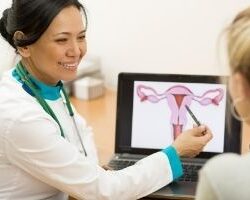
Every woman is born with 1 million eggs and each year thousands die naturally. By puberty, the number of eggs has already decreased to 300,000 and this number will continue to decline. The main issue that women over 40 face in trying to conceive a healthy baby is their lack of egg quantity and quality. The younger the egg, the less likely it will carry abnormalities that prevent it from developing into a healthy embryo.
If you are over 40 and planning a pregnancy, you may have to work a little harder, but a healthy pregnancy is possible. The best way to overcome this age related decline, whether you are trying naturally or turning to advanced treatments such as in vitro fertilization is to eat well, exercise regularly, reduce poor lifestyle choices and consider seeing a fertility specialist.
Here are five key tips for preparing for conception over 40:
- Eat Healthy Foods – The most important thing you can do to dramatically improve egg health is to switch to a nutrient dense fertility diet. Adding fertility superfoods like spirulina, maca, and royal jelly, as well as supplements with key nutrients such as antioxidants, CoQ10 Ubiquinol, and folic acid, will increase your chances for a healthy egg.
- Keep Your Uterus and Pelvic Floor Muscles Healthy – Around the age of 37-40, your egg health and count begin to dramatically decline. So regardless of whether you are trying to conceive naturally, through IUI or IVF, you need to focus on the health of your eggs for at least 3 months prior to conception. Here are two ways to increase egg health:
- Exercise daily for 30 minutes a day, 5 days a week. Through sweating regularly, your body will be able to remove excess toxins, especially xenohormones, which are human-made chemical toxins shown to cause hormonal imbalance through endocrine system. Regular exercise not only reduces fat in the body, it will also help to increase your sense of well-being, stamina and strength.
- Strengthen your uterus and pelvic muscles. Due to the gradual changes in hormone levels after the age of 40, your uterus will slowly begin to lose muscle tone. To strengthen your uterus for pregnancy and the hard work of labor, start walking daily, join a fertility yoga program and do Kegel exercises. Kegel exercises will improve and preserve muscle tone of your pelvic floor muscles and uterus. Fertility massages and placing castor oil packs over your lower abdomen can also help to strengthen the uterus, improve hormonal balance, detoxify the tissues of the reproductive organs and surrounding tissues, and increase circulation to the reproductive organs.
- Manage Your Stress – Women over 40 have had more exposure to the negative effects of stress from their exposure to environmental toxins as well as the stress from daily life. Mind body techniques, acupuncture and yoga can emotionally and physically relieve stress and increase your chances of pregnancy.
- Support cervical mucous production – Cervical mucous production naturally declines with hormonal changes as well. As the cervical fluid decreases, it becomes harder for the sperm to reach the awaiting egg for conception. To support cervical mucous production, you should drink 6 to 8 full glasses of clean, filtered water daily, take a complete omega essential fatty acid supplement daily and take supplements that support cervical mucous production.
- Chart Your Cycle – With only a 6 day window to get pregnant (3 days prior to ovulation, the day of ovulation and 2 days after ovulation), it is important to chart your cycle. A study in Fertility and Sterility Journal determined that if women aged 35 to 40 had sex during the most fertile time in their cycles, the chances for pregnancy increased to 78 percent compared to 84 percent of women between 20 and 34.
Conception, pregnancy and having a healthy child over 40 is possible however if you have been trying to get pregnant for over 6 months without success, it is time to see a fertility specialist at The Fertility Institute. Our doctors will run a full hormone test panel to determine where your hormone levels are at and what hormones may need to be supported. Our specialist can help you find out if there are any other fertility issues that may be hindering conception and provide you with options to pursue a healthy pregnancy.



